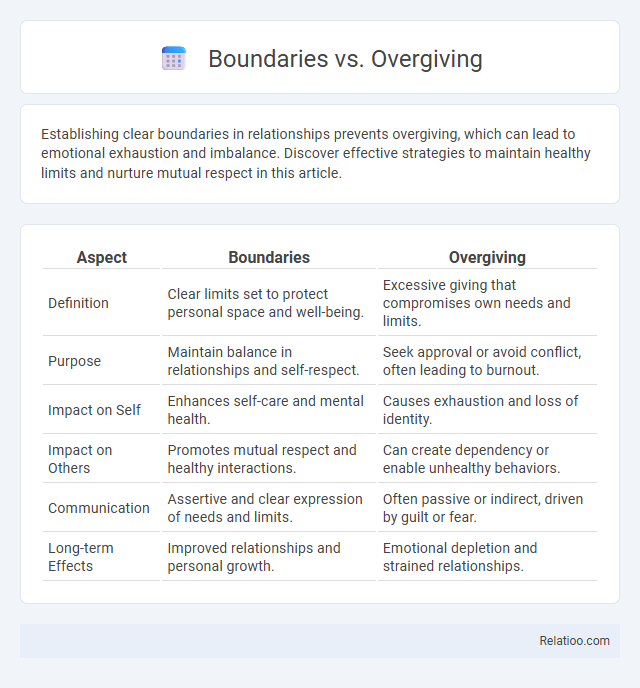Establishing clear boundaries in relationships prevents overgiving, which can lead to emotional exhaustion and imbalance. Discover effective strategies to maintain healthy limits and nurture mutual respect in this article.
Table of Comparison
| Aspect | Boundaries | Overgiving |
|---|---|---|
| Definition | Clear limits set to protect personal space and well-being. | Excessive giving that compromises own needs and limits. |
| Purpose | Maintain balance in relationships and self-respect. | Seek approval or avoid conflict, often leading to burnout. |
| Impact on Self | Enhances self-care and mental health. | Causes exhaustion and loss of identity. |
| Impact on Others | Promotes mutual respect and healthy interactions. | Can create dependency or enable unhealthy behaviors. |
| Communication | Assertive and clear expression of needs and limits. | Often passive or indirect, driven by guilt or fear. |
| Long-term Effects | Improved relationships and personal growth. | Emotional depletion and strained relationships. |
Understanding Boundaries: Definition and Importance
Understanding boundaries involves recognizing your personal limits and clearly communicating them to protect your mental and emotional well-being. Boundaries prevent overgiving, which occurs when you sacrifice your needs excessively, leading to burnout and resentment. Prioritizing your boundaries helps maintain healthy relationships and ensures your energy is preserved for your own growth and happiness.
What Does Overgiving Look Like?
Overgiving manifests as consistently prioritizing others' needs at the expense of your own well-being, leading to emotional exhaustion and blurred personal boundaries. It often involves saying "yes" too frequently, neglecting self-care, and feeling responsible for others' happiness or problems. Recognizing overgiving requires identifying patterns of imbalance where your generosity becomes detrimental rather than supportive.
Signs You Lack Healthy Boundaries
Lacking healthy boundaries often manifests through signs such as chronic people-pleasing, difficulty saying no, and feeling responsible for others' emotions or problems. Overgiving depletes your energy and can lead to resentment, burnout, and loss of self-identity. Recognizing these signs allows you to establish limits that protect your well-being while maintaining meaningful relationships.
The Emotional Cost of Overgiving
Setting clear boundaries protects your emotional health by preventing the drain caused by overgiving, which often leads to burnout and resentment. Overgiving depletes your energy and self-worth as you prioritize others' needs over your own, creating an imbalance that impacts mental well-being. Recognizing your limits allows you to preserve emotional resources and maintain healthier relationships.
Why People Struggle to Set Boundaries
People struggle to set boundaries because they fear disappointing others or facing conflict, often leading to overgiving. Deep-rooted beliefs about self-worth and the desire for approval can blur the line between generosity and self-sacrifice. Your ability to maintain healthy boundaries is crucial for emotional well-being and preventing burnout from chronic overgiving.
Comparing Boundaries and Overgiving Behaviors
Setting clear personal boundaries helps protect Your time and emotional energy, preventing overgiving behaviors that often lead to burnout and resentment. Overgiving occurs when You prioritize others' needs excessively, neglecting self-care and weakening relationships due to imbalance. Comparing boundaries and overgiving reveals that healthy boundaries enable mutual respect, while overgiving blurs roles and fosters dependency.
Benefits of Setting Healthy Boundaries
Setting healthy boundaries boosts emotional well-being by preventing overgiving, which often leads to burnout and resentment. Clear limits foster mutual respect in relationships, enhancing communication and personal autonomy. Healthy boundaries also promote balanced energy distribution, allowing individuals to support others without sacrificing their own needs.
Strategies to Move from Overgiving to Balanced Giving
Setting clear personal boundaries is essential for moving from overgiving to balanced giving, as it helps individuals recognize their limits and prioritize self-care. Strategies include practicing assertive communication to say no without guilt, allocating specific time for personal needs, and regularly reflecting on the impact of giving behaviors on emotional well-being. Incorporating mindful self-awareness techniques enables individuals to distinguish between healthy generosity and overextension, fostering sustainable relationships and preventing burnout.
Common Myths About Boundaries
Common myths about boundaries include the belief that setting them is selfish or will alienate others, whereas healthy boundaries actually foster respect and mutual understanding. Overgiving often stems from unclear boundaries, leading to emotional exhaustion and imbalance in relationships. Recognizing that boundaries are essential for self-care clarifies the distinction between generosity and overgiving, promoting healthier interpersonal dynamics.
Building a Sustainable Path: Prioritizing Self-Care
Establishing clear boundaries prevents the drain caused by overgiving and enables you to maintain your well-being while supporting others. Prioritizing self-care creates a sustainable path that balances generosity with personal health, ensuring long-term emotional resilience. Consistently respecting your limits fosters a healthier, more fulfilling life without sacrificing your own needs.

Infographic: Boundaries vs Overgiving
 relatioo.com
relatioo.com